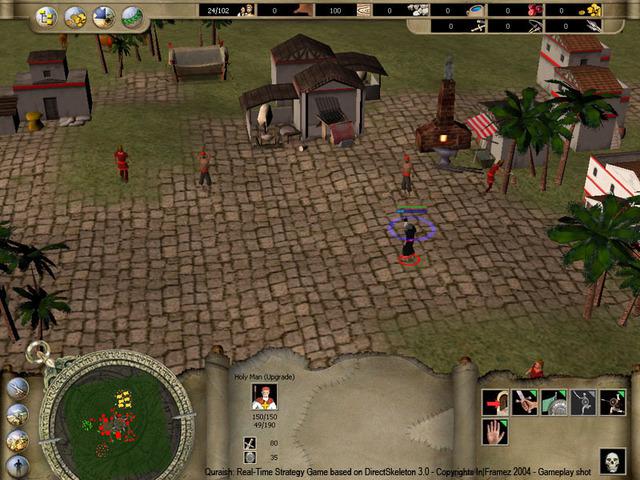Issue 3/2012 - Net section
Non-Violent yet Action-Packed
The Arab PC gaming market is barely ten years old, and US games are still played the most in the region. A young generation of game developers hopes to change things.
»I’m just an Egyptian girl who lives in the present, while keeping in mind the splendors of the past and hoping for a better future – for myself and my country.« This is how Zeinobia introduces herself in her blog egyptianchronicles.1 In a 2008 post about Abu Hadeed, the first computer game produced in Egypt, she declared that the game was »dumb« and »pedagogically worthless,« but still thoroughly funny; in short: a slam dunk.
It’s true that the protagonist of Abu Hadeed – a master butcher with decidedly asinine tendencies – is not your usual kind of hero. The young programmers who founded the production company Khayal Entertainment in Cairo in 2005 were counting on the same brand of Egyptian humor that has sold very well at the country’s box offices for decades. The domestic console gaming industry was rather late to discover it, though. Primarily Western first-person shooter games dominate the market, claims Ahmed Deeb, one of the founders of Khayal. The Middle East’s games market is indeed flooded with American war-themed video games and what Vit Sisler terms digital Orientalism. What the assistant professor for new media at Charles University in Prague means by this is the ahistorical bungle that has been cultivated for example by the Prince of Persia series since 1989, featuring captured sultans’ daughters and rogue viziers.2 This development is troublesome but also ridiculous and therefore still somewhat amusing. The same cannot be said for the ego-shooter games. Here, the player operates in a setting of often highly realistically rendered war zones in the Middle East. The Delta Force series (since 1998) and Kuma/War series (since 2004) are examples of this genre – US productions that allow the players to control US troops in a battle against Muslim terrorists. »The only interaction with others is to kill them,« Sisler concludes. The main reason that this is even possible, Sisler claims, is the lack of criticism of such games in the media. In the Arabic-speaking world such commentary does not exist at all, and in the West the psychological effects of videos games have never been discussed in enough detail. Detailed discussions focusing on the content from case to case can hardly be found. When it comes to reviews and ratings, the emphasis is placed more on values such as user-friendliness, design and the level of difficulty.
Do the young Arabs who so enthusiastically play these US games not notice that they are shooting at themselves? It appears paradoxical – but so does the entire Arabic market.
With 400 million inhabitants, half of whom are under 25 years of age and most of whom own mobile phones, its share of the worldwide revenue of 52.5 billion US dollars could be much greater than the approximately five percent it accounts for at present. Nonetheless, big investors are holding back. One reason for this is certainly that, while the retail sector is very poorly organized, piracy is booming: copyright is literally a foreign term, and bootlegs can be found on every corner practically for free. This is the chaos that the conservatism of the Western market must face. Due to the fact that game production is costly in terms of time as well as money, companies would rather stick to reliable, proven ideas that have been successful in the past instead of treading on unknown ground. They can hardly be blamed, seeing as a lack of knowledge of the Arab market has come at a great cost in the past: for example, when the US company THQ launched an expensive advertising campaign for the cinema release of WALL-, a computer-animated film with an eponymous PC game, it did so in Saudi Arabia of all places, where cinemas are widely banned.
It is hence no wonder that an increasing number of Arab programmers are focusing on their home-field advantages. The Facebook game Happy Oasis (2011) by the Jordanian company Aranim Games introduces children to traditional horticultural techniques with which they can cultivate their own virtual Islamic garden.3 Within a very short time the game attracted 40,000 fans on Facebook. For Mahmoud Khasawneh these are laudable beginnings. But the chief executive of the Dubai-based company Quirkat4, one of around 20 larger game producers in the region, says that this is not enough. The Arab games industry can only truly establish itself by staking out a presence on the global market. With what kind of content, though? Khasawneh, for his part, does not believe the future is in Islamic gardening: »Our top 10 games in the future will be a reflection of the Western best-sellers.« Confronted by a perplexed look on the face of his interviewer, he quickly adds that he does not mean racist portrayals of his own society. The reflection would instead be non-violent, family-friendly, yet packed with action. »Soccer, for example,« he beams.
But the search for identity is evidently not quite that playful.
1 http://egyptianchronicles.blogspot.com/
2 Cf. Patrick Haenni, Video Games in the Arab World and Beyond – Interview with Vit Sisler; http://religion.info/english/interviews/article_413.shtml#.Uih7q7y26hM, as well as Vit Sisler, Digital Arabs: Representation in Video Games; http://www.digitalislam.eu/article.do?articleId=1704
3 http://apps.facebook.com/happyoasis/ (site is inactive, 09/13)
4 http://www.quirkat.com/


